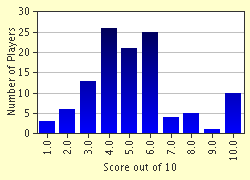Quiz Answer Key and Fun Facts
1. Here we have an adjective which Webster defines as meaning "Partially split or divided". It is often used to describe a fissure which occasionally occurs in the mouth. I won't speak with forked tongue about this word; the verb from which it is derived has two completely contradictory meanings; it is its own antonym.
2. Here's a word you won't want to pass up! Serendipity means finding something useful, desirable or delightful, whilst looking for something else, or when you are not expecting it. This word is derived from a Persian fairy tale called "The Three Princes of Serendip". Serendip is an obsolete name for which of the following countries?
3. At Guilder's World of Words, we have many unique words. Here, we present ephod! An ephod is an article of clothing. Which is it?
4. American slang is ever evolving, and certain words and phrases are instantly identifiable with a particular time and place. Or are they? In the 60s, hippies frequently used the phrase "out of sight" to describe an especially "groovy" person, thing, or place. But in which early 20th century novel was the same phrase uttered for the same purpose by a decidedly non-hippie main character?
5. Please let us show you this financial word. To buy a home, you need to come up with a hefty sum of money. Lacking the resources, many people go to their banks and apply for a mortgage. But what exactly does the word 'mortgage' originally mean?
6. I have a soft spot in my heart for this word, and will only part with it if the price is right. Oxymoron is a word that I've always liked the sound of, especially the adjective, oxymoronic, which sounds like it should roll off the tongue in a Scottish burr. I was interested to learn that the plural of oxymoron is oxymora, which sounds like a village in Ireland. When I consult my 'Penguin Concise English Dictionary', what do I find that oxymoron means?
7. Here we have a choice word! What eight letter word for 'airy', 'light', 'heavenly' and 'unearthly' contains the word earth?
8. Here at Guilder's, we have words of all descriptions! Which of these words has meant "blue" or "blue stuff" for at least the past 3,200 years?
9. I offer for your consideration... four words -- only three of which share a peculiar property. Can you pick from the words that follow the one word that DOES NOT have the same Indo-European root as "peculiar"?
10. Here we have a new collection of imported words, fresh from Australia! Australian slang is indeed a wondrous and at times totally indecipherable thing to an outsider. If you were asked by an Aussie to take a quick look at something which of the following expressions would be used?
Source: Author
ertrum
This quiz was reviewed by FunTrivia editor
Bruyere before going online.
Any errors found in FunTrivia content are routinely corrected through our feedback system.

